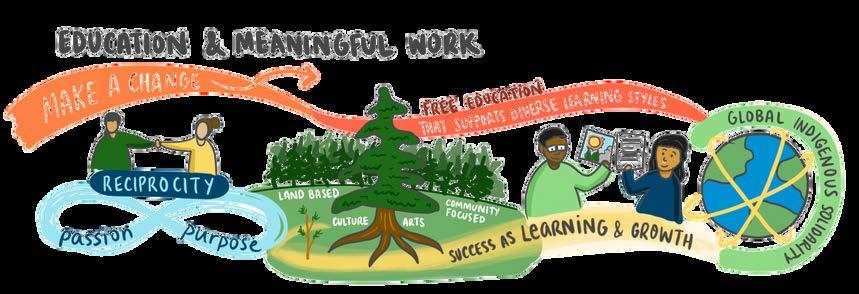
THEME 3


THEME 3

This is an excerpt of a larger report. To read the full report, including more detailed demographic information, and the conclusion and recommendations, visit the link or use the QR code below.

www.indigenousyouthroots.ca/programs/indigenous -youth-reconciliation-barometer-2024



We asked youth what education looks like to them, what supports they need to succeed in education, and what barriers they have faced in their education journeys. Indigenous youth's definitions of education extend beyond receiving post-secondary education and includes things like lived experiences, on the land learning, and participating in culture. When accessing post-secondary education, most youth said that they need increased financial supports to succeed, along with things like more Indigenous-led programs, cultural supports, learning supports, and help with transportation.



The responses in this section paint an expansive picture of how Indigenous youth understand education, and while that picture can include post-secondary or other institutional education, it doesn’t encompass the whole of how Indigenous youth define and experience education. Across all Indigenous youth surveyed, youth were most likely to define education as: 83% 83% of Indigenous youth define education as learning through lived experiences, compared to
When looking at how different demographics of youth chose their top five, these responses held true for most youth. However, there were a few notable exceptions. Two-Spirit youth, transgender men and women, and youth living in the Yukon, Manitoba and Prince Edward Island were more likely to select “pursuing my passions, sports or hobbies” as part of how they define education. Youth living in Québec were more likely to select “completing an apprenticeship or trades program” as part of their understanding of education.




When reflecting on what else education means to them, many responded with similar views to the above, saying that education doesn’t have to be only from a post-secondary institution, but includes a variety of experiences.
Participants in the sharing circles expressed similar sentiments to the survey, saying that education can encompass a variety of things like lived experiences, self-led research, and self-taught skills, as examples. Some youth also shared about how they felt like education outside of institutions should be just as valued.
We also asked youth in the survey about their education and work plans for the next few years. Across all Indigenous youth surveyed, 93% and 95% respectively said that they would likely be using their education to contribute positively to and empower their community or using their lived experiences to do so. Notably, 70% of Indigenous youth surveyed said that they are planning on moving away from their current community for work, and 57% for school.
““
[Education
is] anywhere you gain knowledge
and develop your sense of self or your world view.
-Survey Participant
““
[Education
““


is] participating in programs provided by non-profits, groups, (not your own) communities, conferences, etc.
-Survey Participant
Education
is
not
just going to school to do something. Researching something due to interest is also education.
-Toronto Sharing Circle Participant
““
Artists don’t need
art

an
degree you can go to school to learn art if you want, but if you learn it outside of school your knowledge and skill should still be just as valued.
-East Coast Online Sharing Circle Participant

It is important to note that for many Indigenous youth, moving away from their community for work or school may be a necessity rather than a preferred option, especially for those living on-reserve or in rural and remote areas. Many youth also said they plan on obtaining or furthering their post-secondary education, with 39% saying they will likely obtain a trades certificate in the next few years, 48% saying they will likely obtain a college diploma, 67% saying they will likely obtain a bachelor’s or master's degree, and 53% saying they will likely obtain a PhD.
In the next few years, how likely is it that you will be doing the following?
a job in the community I live in
away from my current home or community for work
Using my education to contribute positively to empower my community
Using my lived experiences to positively contribute to my community


In the next few years, how likely is it that you will be doing the following?




During the sharing circles, when talking about barriers they have faced in education, financial barriers were often brought up. Several youth shared about the lack of available funding for non-status youth, and how not being able to access funding has impacted their educational journey. Some who could access band funding talked about how it is often not adequate or how the requirements were barriers for them, such as not being able to access it as a part-time student. Others shared about lack of accessible scholarship opportunities, citing the inaccessibility of filling out some applications, lack of feedback when receiving rejections, and just not knowing of or being able to find something that is available to them.
Additionally, barriers around receiving funding from Métis governments were shared. One youth shared about how the requirements and funding amounts for this can vary by Métis government, and how the inconsistency can be a barrier for some
““
Housing, food,


When talking about financial barriers, the cost of living was a common theme that emerged. Many youth shared about needing to work while going to school to support themselves, which puts a strain on their education and impacts their overall wellness.




costsIt's awful hard to learn and succeed, to concentrate, when you're working full time trying to make ends meet. With rents the way they are, some folks just cannot afford to take time off work to learn. When you're cutting grocery costs you get sick all the time.
-East Coast Online Sharing Circle Participant

Many other barriers also emerged in the sharing circles, such as needing to leave home communities for school (either for secondary or post-secondary), facing discrimination and tokenization in classroom settings, lack of available childcare, and inaccessible postsecondary application processes. Several youth also shared about the lack of resources for Indigenous students, and how difficult it is to find the resources that do exist.
In the survey, we asked Indigenous youth about how they felt about opportunities for education being made available to them and other Indigenous youth in the future. Despite the barriers faced, most youth in the survey said they felt optimistic about educational opportunities being made available to them. Here, 80% of Indigenous youth said that they felt optimistic about these opportunities, while only 6% said they felt pessimistic.
How optimistic do you feel about educational opportunities being made available to you and other Indigenous youth in the future?
Pessimistic 6%
As outlined previously, Indigenous youth have a wide range of p survey, we asked youth about what supports they need to achieve surveyed, financial assistance was by far the top support neede responses across all Indigenous youth surveyed were:







While these were identified as the most needed supports across the majority of participants and demographic breakdowns, some groups were more likely than others to include certain options in their top five:
More likely to need more local or online education opportunities:
Youth living in British Columbia (40%)
Youth living in the Northwest Territories (50% - low # of responses)
Youth living in the Yukon (50%)
Youth living in Prince Edward Island (100% - low # of responses)
Youth living on-reserve (47%)
Youth living in remote or rural areas (48%)
More likely to need more near campus subsidized housing for Indigenous students:
Inuit youth (43%)
Youth living in Newfoundland & Labrador (50%), Youth living in Nunavut (50%)
More likely to need more Indigenous teachers:
Youth living in the Northwest Territories (50% - low # of responses)
In the sharing circles, youth identified similar barriers to accessing education. When discussing this, youth called for enhanced and accessible financial supports such as low-requirement grants. Some youth also called for more supports in finding and applying for available grants and bursaries – and even just applying to school in the first place – as well as wanting to see more assistance from within post-secondary schools for this. For many of the youth who have been able to access band funding, that support has been fundamental to their success in education and highlights the need to extend sufficient funding to all Indigenous post-secondary students.
91% 91% of Indigenous youth said that they need financial assistance to support their educational goals.
““ ””
Maybe you get funding for school, but it’s only for your courses and not living expenses so you still have to work. There should be more funding available, more resources to take care of other expenses so youth can focus on their education and living a balanced life.
-Victoria Sharing Circle Participant



Many also reflected on the need to recognize lived experiences and traditional knowledge as valid forms of education, while calling for post-secondary spaces to be better tailored to Indigenous students. Several youth also talked about how more cultural and wellness supports should be provided by institutions to ensure that Indigenous young people are able to succeed in these spaces.
““
”” The structure of educational spaces needs to be more fluid, especially for Indigenous students. There are so many different ways of learning/expressing knowledge. I struggle to relate my learning to credits and classes. There needs to be more accommodation for structure not looking a certain way.
-East Coast Online Sharing Circle Participant

Overall, supports needed for Indigenous youth to succeed in educational institutions depend on a variety of circumstances. Generally though, Indigenous youth want to feel safe and supported in educational settings and as they pursue their education goals, they called for better financial supports to ensure their success. As noted, when discussing what education means to Indigenous youth, many feel education is about things like lived experiences, on the land learning, and learning your cultural traditions, in addition to post-secondary education. Indigenous youth often want to see these non-institutionalized forms of education recognized and adapted into post-secondary learning environments and valued on the same level as degrees and diplomas.



Before beginning a conversation about how Indigenous youth rela they understand to be meaningful work, we explained that “work” project is not limited to the labour we exchange for wages to s context. For the purposes of this study, work can include domes defense and advocacy, volunteer and community work, and other f labour. We also asked youth to give us their definitions of “me talk about what impacts they wanted to see from their work, and need to pursue work that is meaningful to them.
In reviewing survey answers to the question “how do you define meaningful work?,” wealth, finances, and money were not key elements of youth definitions, but community, giving back, and helping people were front and center. We also asked youth what kind of impacts they would like to see come from their labour, whether at the personal, community, national, or global levels. Their responses indicate a deep commitment to advocating for national and global change and improving their communities through working in healing and wellness, and by supporting youth, Indigenous women, and Two-Spirit LGBTQQIA+ youth. While these answers highlight diverse aspirations among the youth, they also indicate an intense focus on making a meaningful difference in their communities and beyond.

““ ””
Meaningful work to me
means contributing for the advancement and betterment of my people and my community.
-Survey Participant


Meaningful work for me is when I am doing something that feels good to my spirit
and helps me sustain a modest lifestyle, like affording a place to live close to nature, nutritional food, and lots of personal time. ””
-Survey Participant
Many Indigenous youth also expressed a desire to support younger generations, especially through mentorship roles that help youth connect with their cultural heritage and feel supported and confident in their decisions. Youth also expressed wanting to help other young people navigate violent colonial systems like the child welfare system.
Several participants focused on meaningful work as advocacy that advances Indigenous rights and holds the Canadian government accountable for past and ongoing violence and discrimination. Some youth talked about this in the context of working to create systemic change through policy work and advocacy, and many talked about it in relation to land defense and activism.
““
Promoting healing and wellness within Indigenous communities is another strong thematic concern in the survey response. Many Indigenous youth aspire to support mental health and healing journeys, both personally and for others.

-Survey Participant


I want to be a safe person for younger youth in care. I want to hold empathy and be able to help guide them in a way that best supports their decisions, without holding judgment.


Supporting Two-Spirit LGBTQQIA+ communities and empowering Indigenous women was also a key impact and part of youth’s definitions of meaningful work. Participants want to create inclusive spaces where individuals can embrace their identities without fear, and some also spoke about pursuing a work path that allows them to advocate for gender equality and advocate for more Indigenous women in decision-making roles. Most importantly, youth’s ideas about meaningful work and its impacts were not money-centered but rooted in values, connection, relationships, and holistic health.


-Survey Participant ““ ””
Most fundamentally, meaningful work resonates with who I am as an Indigenous person. It flows from my identity, empowers my selfdetermination and aligns with my community's needs and aspirations.
-Survey Participant ““ ””
I like to see more healing and growing as an impact from the work that I do/will do. I want to feel that impact on myself and others. I want to have an impact of acceptance and vulnerability to being a two-spirit Inuk in an urban life on the people around me and on myself.


supports do Indigenous youth need to pursue meaningful work?
In asking youth what supports they need to find or maintain meaningful work, the top choice was social, emotional, or cultural supports. The next most selected supports were having a safe and supportive work environment; mentors, job coaches or job shadowing programs; Indigenous youth job training programs; and Indigenous-led career opportunities.

Across First Nations, Métis, and Inuit youth, the most frequently identified supports needed for Indigenous youth to pursue meaningful work was social, emotional, or cultural supports; having a safe and supportive work environment; mentors, job coaches or job shadowing programs; Indigenous youth job training programs; and Indigenous-led career opportunities. Notably, Inuit youth included having access to Indigenous-led career opportunities in their top 3 supports, where First Nations and Métis youth did not. Métis youth ranked having a safe or supportive work environment higher than First Nations and Inuit youth did.
said they need these supports to pursue meaningful work:
Having a safe or supportive work environment (59%)
1. Mentors, job coaches or job shadowing programs (56%)
3.
2. Social, emotional or cultural supports (53%)
Youth in the territories were more likely to cite upgrading essential skills and career information and advice as a key support needed for them. Relatedly, youth living in remote, rural, and onreserve communities reported needing access to Indigenous youth job training programs at a higher rate than youth living in urban communities. For youth living in urban communities, 48% said that they need Indigenous youth job training programs, compared to 59% of youth living in rural or remote areas, and 54% of youth living on-reserve.
Notably, 37% of people with a disability identified universal basic income as one of the most needed supports to pursue meaningful work, compared to 17.2% of people without a disability.
Overall, most Indigenous youth surveyed (76%) felt optimistic about the meaningful work opportunities being made available to them and other Indigenous youth in the future. When looking at how different demographics responded to this question, some youth were less likely to say that they feel optimistic about these opportunities being made available.


1. Having a safe or supportive work environment (55%)
Social, emotional or cultural supports (57%)
2. Mentors, job coaches or job shadowing programs (47%)
3. Indigenous-led career opportunities (44%)
4. Indigenous youth job training programs (42%)
5. Universal basic income (37%)
6. said they need these supports to pursue meaningful work:
37% 37%
of survey participants with a disability identified universal basic income as one of their most needed supports to pursue meaningful work, compared

Notably, youth with a higher level of education tend to say they feel more optimistic about meaningful work opportunities in the future. As we revealed earlier in this report, youth place more importance on learning through lived experiences rather than traditional institutions, and this imbalance in optimism may reflect how society and institutions continue to put more emphasis and supports around traditional forms of education and work.
Education Level of Indigenous Youth Surveyed Compared with Optimism Toward Meaningful Work Opportunities

76% of all survey participants said that they feel optimistic about meaningful work opportunities in the future.
Indigenous youth less likely to feel optimistic about meaningful work opportunities being made available to them:
Afro-Indigenous youth (63%)
Youth living in Nunavut (64%)
Youth living in the Yukon (64%)
Youth living in Prince Edward Island (67%)*
Youth living in Alberta (67%)
Youth who are living with or are unsure if they are living with a disability (67%)
Indigenous youth more likely to feel optimistic about meaningful work opportunities being made available to them:
Youth living in the Northwest Territories (100%)*
Youth living in New Brunswick (81%)
Youth living in Quebec (88%)
Métis youth (81%)
Cisgender men (80%)
Transgender men (82%)
Transgender women (90%)
*There were low amounts of responses from youth in these locations
In discussing what education and meaningful work look like to Indigenous youth, we also asked youth how they envision the future of education and meaningful work. Throughout these conversations, supporting community and being a mentor for the generations coming up remained a huge part of success for youth. Looking to the future, youth remained focused on thinking generations ahead in terms of building community supports and capacity. Youth also envision low and no-barrier education, and workplaces that are culturally safe.
in work and education is setting goals in those places and working towards them and learning then adapting your goals based on your new knowledge. Work that will have an impact to a community. The impacts will benefit the community no matter how big or small that benefit is.
-Inuit Nunangat Online Sharing Circle Participant
What does success in education and work mean to Indigenous youth?
Across all Indigenous youth surveyed, when asked to select what success in education and work means to them, youth most frequently said “working toward the advancement of Indigenous peoples.” The top five most selected definitions were:



When looking at how youth responded based on Indigenous identity, the five most selected options were largely aligned with the responses noted above. A divergence is visible when looking at responses from First Nations and Métis youth, where achieving financial stability was included at the fourth and fifth most selected response, respectively. Achieving financial stability was also an important definition of success to Two-Spirit youth, with this option being the third most selected. Some different selections also emerged when looking at how youth responded based on province or territory. Here, youth living in Newfoundland and Labrador more frequently said that having the flexibility to balance life and career is part of their definition of success, at the fourth most selected option for these youth. An important distinction that emerged was that youth living in the territories were more likely to include achieving financial stability in their top five definitions of success. For most provinces, this definition did not appear in the top five, and when it did was ranked fourth or fifth (Prince Edward Island and Manitoba). For youth living in the territories, achieving financial stability was either the second or third most selected definition.
Additionally, when looking at how youth responded based on the type of community they live in some responses shift in terms of importance, with achieving financial stability also being seen as a definition of success for some youth here. How youth responded based on their community type is outlined below.
-Toronto Sharing Circle Participant ““ ””
Success in education is less about what you’ve learned, and more about how you’ve grown.
Less about learning all the information and know it exactly, more about growing as a person and broadening your perspective of the world and how it works around you/how you interact with it.


Urban

Remote or Rural
Working toward the advancement of Indigenous people
Being in a position to help out my family and community
On-Reserve
Being a role model to family members and/or community members
Being a role model to family members and/or community members
Prefer not to say
Being a role model to family members and/or community members
Being in a position to help out my family and community
Working toward the advancement of Indigenous people
Achieving financial stability
Having flexibility to balance a life and career
Being in a position to help out my family and community
Working toward the advancement of Indigenous people
Being able to focus on collective success rather than individual gain
Building meaningful relationships with family, peers and community
Achieving financial stability
Being able to focus on collective success rather than individual gain
Building skills in order to contribute to my community’s success
Being a role model to family members and/or community members
Building skills in order to contribute to my community’s success
Working toward the advancement of Indigenous people
Achieving financial stability
Youth living with a disability also tended to respond differently to this question. For them, being in a position to help out family and community was the most selected response, with working toward the advancement of Indigenous peoples being next. Achieving financial stability was also in the top five most selected definitions for youth living with a disability at number four. Their top five most selected responses are outlined below.
Disability Status
No
Yes or Unsure
Working toward the advancement of Indigenous people
Being a role model to family members and/or community members
Prefer not to say
Being in a position to help out my family and community
Working toward the advancement of Indigenous people
Being in a position to help out my family and community
Achieving financial stability
Having flexibility to balance life and career
Being a role model to family members and/or community members
Building meaningful relationships with family, peers and community
Being able to focus on collective success rather than individual gain
Building meaningful relationships with family, peers and community
Achieving financial stability
Working toward the advancement of Indigenous people
Building meaningful relationships with family, peers and community
Being a role model to family members and/or community members



We also asked youth in the sharing circles about what success in education and work looks like to them. In these spaces, youth often shared that they want to see their work and education impact their communities in a positive way. Some youth shared that they hope that they can pass along their knowledge and skills to other Indigenous youth and people in their communities. Many also talked about how working or learning in a space that respects their Indigeneity is part of success for them. Several participants talked about goals that they have for working in spaces that are a shift from the traditional nine-to-five type of work and that move away from the typical colonial environments of many workplaces.
““
Success in education/work doesn’t mean becoming part of a society that’s nine to five,
but I’d like to see more land-based learning and hands-on skill development. Everyone’s brain learns differently. Success is recognizing everyone’s unique abilities and providing an environment in which everyone can flourish.
-Toronto Sharing Circle Participant
““ ””
A successful education space would be inclusive and adaptable to
those most discriminated against by colonialism and systemic racism, especially those excluded by disabilities who have so many more barriers to accessing those spaces equitably.
-Inuit Nunangat Online Sharing
Circle



For many youth, success in education and work is more than finding a job with good pay. In the sharing circles, youth often talked about how success in education and work for them means being able to grow personally. Participants also shared about how a successful job or education would align with their passions and interests, while allowing them to help their communities and pass on knowledge as mentioned previously. Another common theme that emerged was that Indigenous youth often feel like success in education and work is tied to their ability to have a work-life balance and being able to participate in cultural activities without worrying about repercussions from time off from work or school.
““
There’s this colonial mindset, we’ve been conditioned to believe what work means or looks like.
But as Indigenous peoples we go hunting for months, we harvest, work in cycles, work is seasonal. Meaningful work is being able to survive without worrying [financially] while also maintaining work-life balance. What you do for community is what matters.
-Whitehorse Sharing Circle Participant
In all of our engagements, Indigenous youth shared a wide range of thoughts and stories about how they see success in work and education. Overall, youth often described success as being able to contribute to their communities while growing personally, as exemplified in the survey responses. Things like financial stability were also important pieces of success to many youth, while still being able to maintain a work-life balance and be able to take time away to participate in cultural activities.




In the sharing circles, we asked Indigenous youth about what opportunities in work and education they would like to be made available five to ten years from now for themselves and other Indigenous youth. Youth shared their visions for work and education, often imagining a future where these spaces are reshaped and decolonized. Some youth talked about wanting to see things like land-based learning incorporated into education, while others shared visions of a future where work and education are flexible and tailored to an individual’s needs.
When talking about the future of education specifically, youth frequently discussed wanting to see a future without barriers to accessing it. Many talked about wanting to see the financial burdens of education be eased in the future, either through increased access scholarships and grants or by eliminating tuition all together. Some also brought up the need to remove barriers for people living with a disability to access education, saying that the structure of education now often does not set up these students to succeed. Many talked about envisioning a future where there are more Indigenous-led programs at educational institutions, and where education is accessible to youth living in all areas of the country.
Standards of professionalism should be abolished.
I would
like to see it acknowledged that all hair types, all tattoos, all cultural identities and expressions can be professional.


““ ””
-Toronto Sharing Circle Participant
““
There should be someone to help Indigenous students at high schools to help with post-secondary information.
Youth often talked about wanting to see a future where Indigenous students at all levels have proper wellness and cultural supports in place and supports to help them navigate through their educational journey.
Indigenous student groups should be more implemented at universities, so you are more supported with access to medicines, Elders, etc.
-Halifax Sharing
Circle Participant
””
When discussing the future of work specifically, youth often brought up how they want to see a future where the current Western idea of professionalism isn’t the standard. Many also expressed their desire to see more flexible workplaces that promote the wellness of their employees. For many Indigenous youth, workplaces that are more aligned to Indigenous ways of being are a strong desire for the future.
““
Looking
at a decolonized idea of what ‘school’ is, such as taking kids on the land and teaching them how to skin a deer. Teaching what was once common knowledge.
-Halifax Sharing Circle Participant
things
””
““ ””
Remote work - being able to show up as I am that day. My value and work does not change based on how I show up, what I wear, etc. Allowing people to express themselves however they want is really important because those things do not equal who you are and what you’re capable of. Flexible hours – being able to be in a meeting and log off or go for a walk to recuperate from Zoom fatigue has been helpful for managing neurodivergence and mental health.
-Toronto Sharing Circle Participant
The Indigenous youth that we spoke with in the sharing circles have visions of a future where they are supported and encouraged in their education and workplaces. Many have called for a shift away from the current standard and want to see things change so they and other youth can achieve their visions of success in these areas without sacrificing their overall health


For Indigenous youth, meaningful work has to include helping people and/or giving back to their communities, including by becoming mentors, role models, and safe spaces for other Indigenous youth and children.
Most Indigenous youth feel optimistic about opportunities for education and meaningful work being made available to them and other Indigenous youth in the future (76% for meaningful work and 80% for education)
Indigenous youth overall see working toward the advancement of Indigenous people as the most important metric of success, as well as helping out their family and communities and focusing on collective success over individual gain
For the youth that have been able to access it, First Nations band funding has been crucial to their ability to access post-secondary education







Indigenous youth need safe and supportive work environments, more Indigenous mentors, and more Indigenous-led career opportunities
Youth living in remote, rural, and on-reserve communities need access to more Indigenous youth job training programs
More opportunities needed for online and/or local education, so that youth don’t have to leave their communities for education
Lived experiences and other learning avenues outside of traditional institutions are not recognized by schools and workplaces as being valid
Indigenous youth are calling for subsidized housing near schools, particularly for Indigenous students living in the North
More financial assistance for post-secondary education, with less stringent requirements, more accessible application processes and criteria
Youth from some demographics are more likely to say that achieving financial stability is an important part of success to them
All forms of education and knowledge are recognized by schools and employers as valuable, including the lived experiences and traditional knowledge of Indigenous peoples
Schools and workplaces have shifted away from Western standards, prioritizing flexibility and wellness (such as by allowing Indigenous youth time away to participate in cultural activities, and incorporating land-based learning into curriculum
Youth can access online education, employment, and job training opportunities no matter where they live, without having to leave their communities
No financial barriers to accessing education, whether through low-barrier grants and scholarships, or free tuition
Ample Indigenous-led career opportunities where youth can learn from Indigenous mentors